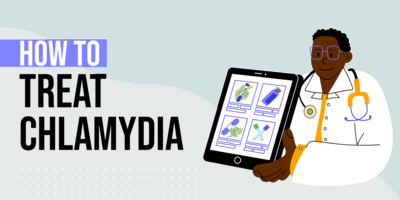
How to Treat Chlamydia
Chlamydia is a bacterial infection that is spread by sexual contact, according to the CDC. It is one of the most...
Read moreHelp patients book appointments with you on Solv. It's free!
20 instant-book locations




Help patients book appointments with you on Solv. It's free!
According to the CDC, anyone who is sexually active can get chlamydia, but the infection is more common in certain groups. Individuals between the ages of 15 and 24, those with multiple sexual partners, and those who do not consistently use a condom are at a higher risk. In New York, NY, considering the diverse and dynamic population, it's especially important for sexually active individuals to get tested regularly.
Getting tested for chlamydia is crucial as it often does not present symptoms, leading to it being undiagnosed and untreated. This can result in severe health complications such as infertility, ectopic pregnancy, and pelvic inflammatory disease. According to the CDC, regular testing allows for early detection and treatment, preventing these complications. In a densely populated city like New York, regular testing is vital to control the spread of the infection.
Urgent care and walk-in clinics are convenient options for chlamydia testing in New York. These clinics often offer same-day or next-day appointments. One such location is Northwell Health-GoHealth Urgent Care, located at 41 E 8th St, New York, NY 10003. You can book an appointment through Solv’s website and mobile app.
Primary care providers are another reliable option for chlamydia testing. They can provide comprehensive care and follow-up treatment if necessary.
For those without insurance or with limited financial resources, free STD testing and community health centers are available in New York. These centers provide confidential testing services.
At-home testing is a convenient and private option. Kits can be ordered online, and the test can be done from the comfort of your home. The samples are then sent to a lab, and results are typically available within a few days.
According to the CDC, New York has a high prevalence of chlamydia compared to other cities and counties in the United States. The infection rate has been increasing over the years, emphasizing the importance of regular testing and safe sexual practices.
Risk factors for chlamydia in New York include age, multiple sexual partners, inconsistent condom use, and previous or co-existing sexually transmitted infections. The city's large and diverse population also contributes to the spread of the infection.
In addition to chlamydia, other common STDs in New York include gonorrhea, HIV, syphilis, and hepatitis. Regular testing for all STDs is recommended for sexually active individuals. Testing locations such as Smart Care in Brooklyn, NY, and PromptMD in Hoboken, NJ, offer comprehensive STD testing services.
Solv has strict sourcing guidelines and relies on peer-reviewed studies, academic research institutions, and medical associations. We avoid using tertiary references.
A chlamydia test is an STD test that can tell you if you have chlamydia or not. According to A chlamydia test is used to determine the presence of chlamydia bacteria in the body, according to the National Institutes of Health. It can be used to confirm whether you have chlamydia even if you don't have any symptoms. According to the National Institutes of Health, chlamydia symptoms include pain when peeing and frequent urination. It can cause abnormal vaginal bleeding in women, and it can cause discharge from the penis in men. the NIH, it can be done as a urine test or a swab test, albeit the swab test is normally only done on women. Many healthcare practitioners that provide lab test services can deliver a chlamydia test.
A chlamydia test is used to identify whether chlamydia bacteria is present in the body, according to the National Institutes of Health. It can be used to determine whether you have chlamydia even if you don't have any symptoms. According to the National Institutes of Health, chlamydia symptoms include pain when peeing and frequent urination. It can cause abnormal vaginal bleeding in women, and it can cause penile discharge in men.
A chlamydia test can reveal whether or not you have the STD and help you avoid infecting others. For sexually active women under the age of 25, males who have intercourse with men, HIV patients, and pregnant women under the age of 25, the National Institutes of Health recommends yearly chlamydia tests. This STD test is particularly recommended for women over the age of 25 who have had multiple sexual partners and whose partners have used condoms incorrectly or inconsistently.
According to the National Institutes of Health, the chlamydia test provider will ask you to urinate into a sterile collecting cup during the urine test. Lab technicians examine your urine sample for the presence of chlamydia bugs. According to the National Institutes of Health, a healthcare provider will use a swab or brush to collect a sample of cells during a pelvic exam. After that, the sample is transported to a laboratory for analysis.
According to the National Institutes of Health, lab test providers may advise women getting a chlamydia test to avoid using vaginal douches or lotions for at least 24 hours prior to the test. It's also possible that men and women will be asked to stop taking antibiotics for at least 24 hours before the STD test.
Symptoms of chlamydia usually show one to three weeks after infection, according to the University of Wisconsin. However, 75 percent of women and 50 percent of men with chlamydia exhibit no symptoms, according to the institution. The only way to find out whether you have chlamydia is to go to an STD testing center and take a chlamydia test. Symptoms of chlamydia usually show one to three weeks after infection, according to the University of Wisconsin. However, 75 percent of women and 50 percent of men with chlamydia exhibit no symptoms, according to the institution. The only way to find out whether you have chlamydia is to go to an STD testing center and take a chlamydia test.
You shouldn't test positive for chlamydia after you've done therapy. According to the University of Rochester Medical Center, chlamydia can be successfully treated with azithromycin or doxycycline. According to the University of Rochester Medical Center, people with lymphogranuloma venereum, a kind of chlamydia, may need 21 days of treatment. Furthermore, the institution recommends that you refrain from all sexual activity for at least seven days or until your chlamydia treatment is finished.
A chlamydia test is available at many healthcare facilities that perform lab tests and STD testing services, such as hospitals, urgent care centers, and walk-in clinics. Solv is one of the simplest and most convenient ways to locate chlamydia test providers in your area. Type "chlamydia test" or "STD testing" into the search field on Solv's website, then enter your location to find top-rated providers and arrange an appointment online.
Annual Wellness Exam in New York
Chickenpox Vaccine in New York
DOT Exam in New York
Ear Wax Removal in New York
Eye Exam in New York
Flu Shot in New York
Hepatitis Vaccine in New York
Measles Vaccine (MMR) in New York
Pap Smear in New York
Physical Exam in New York
Shingles Vaccine in New York
Sinus Infection Treatment in New York
Sports Physicals in New York
Tetanus Shot in New York
Typhoid Vaccine in New York
Well-Woman Exam in New York
Yellow Fever Vaccine in New York
A1C Test in New York
CMP Test in New York
Chlamydia Test in New York
Diabetes Test in New York
Gonorrhea test in New York
H Pylori Test in New York
HIV Test in New York
Hepatitis test in New York
Herpes Test in New York
Mono Test in New York
Pregnancy Test in New York
STD Testing in New York
Strep Test in New York
Syphilis test in New York
TB Test in New York
Thyroid Test in New York
Trichomonas Test in New York
Vitamin D Test in New York
Tips, advice, news—your resource to stay healthy and safe while improving your experience with healthcare providers when you need them.